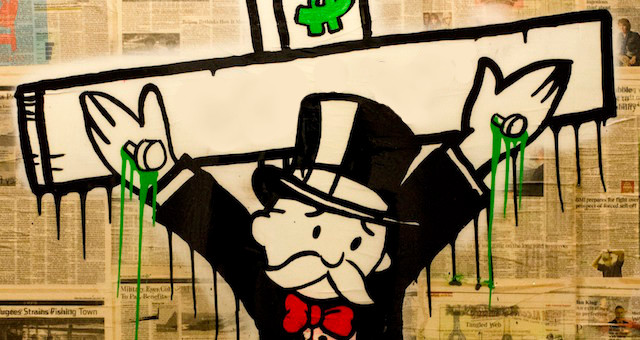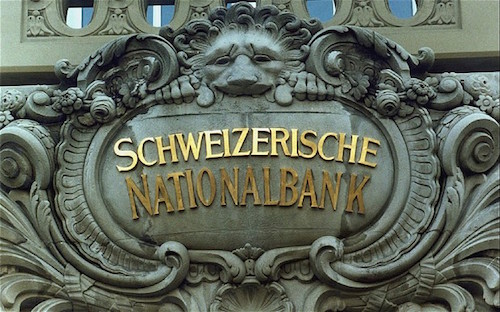The Swiss Sovereign Money Initiative targets the Swiss banks, that already today are quite conservative in giving new loans. It fails to target the real responsible of the massive Swiss money creation, the Swiss National Bank. “If you want to continue to be slaves of the banks and pay the cost of your own slavery, then let bankers continue to create money and control credit.” –Josiah Stamp Isaac Davis, Staff Waking Times The revolt against the banking class in Iceland Iceland has gained the admiration of populists in recent years by doing that which no other nation in the world seems to be willing or capable of doing: prosecuting criminal bankers for engineering financial collapse for profit. Their effective revolt against the banking class, who drove the tiny nation into economic crisis in 2008, is the brightest example yet that the world does not have to be indebted in perpetuity to an austere and criminal wealthy elite. In 2015, 26 Icelandic bankers were sentenced to prison and the government ordered a bank sale to benefit the citizenry.
Topics:
George Dorgan considers the following as important: Activism, All Original Articles, Business, Contributors, Evolution & The Shift, Featured, Governance, Ideas, Isaac Davis, Josiah Stamp, Money, News & Info Matrix, newsletter, révolution, Sam Gerrans, Society, sovereign money initiative, Switzerland, Vollgeldinitiative, Waking Times
This could be interesting, too:
RIA Team writes The Importance of Emergency Funds in Retirement Planning
Nachrichten Ticker - www.finanzen.ch writes Gesetzesvorschlag in Arizona: Wird Bitcoin bald zur Staatsreserve?
Nachrichten Ticker - www.finanzen.ch writes So bewegen sich Bitcoin & Co. heute
Nachrichten Ticker - www.finanzen.ch writes Aktueller Marktbericht zu Bitcoin & Co.
The Swiss Sovereign Money Initiative targets the Swiss banks, that already today are quite conservative in giving new loans. It fails to target the real responsible of the massive Swiss money creation, the Swiss National Bank.
“If you want to continue to be slaves of the banks and pay the cost of your own slavery, then let bankers continue to create money and control credit.” –Josiah Stamp
The revolt against the banking class in Iceland
Iceland has gained the admiration of populists in recent years by doing that which no other nation in the world seems to be willing or capable of doing: prosecuting criminal bankers for engineering financial collapse for profit.
Their effective revolt against the banking class, who drove the tiny nation into economic crisis in 2008, is the brightest example yet that the world does not have to be indebted in perpetuity to an austere and criminal wealthy elite. In 2015, 26 Icelandic bankers were sentenced to prison and the government ordered a bank sale to benefit the citizenry.
Inspired by Iceland’s progress, activists in Switzerland are now making an important stand against the banking cartels and have successfully petitioned to bring an initiative to public referendum that would attack the private banks where it matters most: their power to lend money they don’t actually have, and to create money out of thin air.
“Switzerland will hold a referendum to decide whether to ban commercial banks from creating money.
The Swiss federal government confirmed on Thursday that it would hold a plebiscite, after more than 110,000 people signed a petition calling for the central bank to be given sole power to create money in the financial system.
The campaign – led by the Swiss Sovereign Money movement and known as the Vollgeld initiative – is designed to limit financial speculation by requiring private banks to hold 100pc reserves against their deposits.” [The Telegraph]
Switzerland: One of the safest harbors for storing wealth
Switzerland is in a key position to play a revolutionary role in changing how global banking functions. In addition to being the world’s safest harbor for storing wealth, it is also home to the Bank for International Settlements (BIS), a shadowy private company owned by many of the world’s central banks, and acting as a lender to the central banks. The BIS is the very heart of global reserve banking, the policy that enables banks to lend money that does not actually exist in their bank deposits, but is instead literally created electronically from nothing whenever a bank extends a line of credit.
Reserve banking is the policy that guarantees insurmountable debt as the outcome of all financial transactions.
The Sovereign Money initiative in Switzerland aims to curb financial speculation, which is the intended and inevitable result of reserve banking, the tool that makes financial adventurism possible by supplying the banks with endless quantities of fiat money.
Limiting a bank’s ability to produce money from nothing would be a direct blow to the roots of the banking cartel, and would cripple their ability to manipulate the world economy. Here’s how it works, in rather simplified terms:
“…if we had access to the same computer terminals the banks have, we could magic in or out of existence all the imaginary stuff we are trained to think of as important – money – in whatever quantities we liked.
This is how it works: when they print quite a lot of this stuff there is a boom. When they print too much of it, there is inflation (actually, the printing of money is inflation). When they stop printing it or simply hold on to it, there is a depression.” [Source]
Swiss National Bank as the only Creator of Money
In Switzerland, 90% of all money in circulation is electronic, and for this, The National Bank of Switzerland has become the direct target of the Sovereign Money Campaign. Swiss law has in the past required required banks to back all currency creation with collateral assets like physical silver or gold, however in recent decades the climate has changed, and, “due to the emergence of electronic payment transactions, banks have regained the opportunity to create their own money.”
The grass roots campaign said in a public statement regarding the intentions of the referendum, “banks won’t be able to create money for themselves any more, they’ll only be able to lend money that they have from savers or other banks.”
This is an interesting twist in the human saga of man vs. banks, and while it remains to be seen if the referendum passes or not, it must be pointed out that it does have its own problems, articulated by Sam Gerrans:
“… it does say that the central bank should be given sole right to create money. This would essentially leave the creation of money in the same hands as those who control the Federal Reserve or the Bank of England rather than allow them to farm out the process. But at least it shows that people are beginning to wake up to where the true power lies.
In the unlikely event that this grass-roots movement in Switzerland should get its way and its proposed legislation be enacted, and then begin to morph into something which really does threaten the banking elite, we must not be surprised if Switzerland is shortly discovered to be harboring weapons of mass destruction, or to have masterminded 9/11, or to be financing Islamic State.”
Part of the cultural conditioning of our time is an ingrained, pre-assumed dependency on sacred cow institutions like banking. Just like it is impossible for most Americans to envision a world without Democrats and Republicans, it is difficult for most people to imagine a world without predatory global banking.
Yet, there are a number of other possibilities for trading, storing wealth, and facilitating development in the world. This is not the only economic system we can imagine, and as Iceland has proven, people can regain control of their collective wealth, so perhaps this revolution will foment further in Switzerland, presenting a chance to at least bring greater awareness to the truth about central banking.
But what if the central bank is irresponsible?
The problem with the Sovereign Money Initiative is that it assumes the central bank is responsible and does not create too much money herself. And this is exactly not the case with the Swiss National Bank.
In recent years, she has massively increased the monetary aggregate M0, the so-called base money or central bank money. The base money (or a multiplier of it) acts as a limit on M1, the so-called “broad money supply“. This is the money commercial banks can create. When there is too much M0, then the central banks disables the limitations on M1.
Sovereign Money Initiative is a war on banks but not on central banksters
Therefore the Swiss Money Initiative has exactly the wrong target. As opposed to the ones in countries, Swiss banks are very responsible. They often insist on 20% down-payment and look what happens to your mortgage when interest rates rise to 5%. (the so-called sustainability).
The only irresponsible is the Swiss National Bank.



My spouse and i have been quite contented Jordan managed to do his research through the entire ideas he discovered through your web pages. It’s not at all simplistic to simply possibly be giving for free tips and tricks which people may have been making money from. And we also realize we need you to give thanks to because of that. The specific explanations you made, the simple site menu, the friendships you will assist to foster – it’s got all overwhelming, and it’s helping our son in addition to our family believe that that article is interesting, which is certainly seriously fundamental. Thank you for the whole lot!